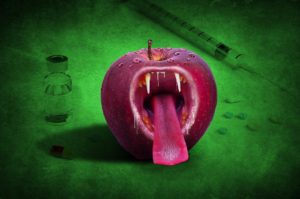By Aaron Boike, 3CLICK Fitness Lead Trainer, B.S. Kinesiology, ACE Certified Health Coach and Personal Trainer
The world of the human microbiome has been blown wide open in the past few years, with groundbreaking research that has helped us to understand just how important it is, and how widely if affects our daily lives. While gut health has been a hot topic in wellness for a while, the scope of the gut microbiome’s impacts is now known to affect weight, sleep, mood, immune function, risk for chronic diseases, and even your behavior. In fact, your gut microbiome, which is the microbial “genes” that reside in your gut, are millions of times that of your actual human genome. Many scientists now theorize that the microbial gene impacts go beyond that of your actual inherited genome, making the microbiome one of the most important aspects of your health and wellness.
Regarding Weight
The microbiome has a remarkable amount of control over feelings of hunger, satiety, nutrient absorption, and inflammation. Since obesity is an inflammatory condition, it can be expected that there is a direct correlation between an unhealthy microbiome and weight. In addition, research shows that the microbiome impacts insulin resistance, affecting your body’s ability to bring blood glucose into your cells. When we become insulin resistant, the result is an increase in fat storage and a decrease in energy that is usable at the cellular level.
Regarding Mood
While more research on humans is needed, there is a great deal of animal study (including with our closest relative, the chimpanzee) that show a strong link between the health of the microbiome and the mood, sociability, and susceptibility to anxiety and depression of the animal. Treatment of to improve the health of the microbiome is now being used as an intervention for psychological issues. A term coined “The Gut-Brain Axis” is used to describe the link between the gut microbiome and the brain.
So What Can I Do To Improve The Health of My Microbiome?
Think of the microbiome like a colony of your little helpers. You can fuel the army to make it healthy and strong (with nutritious healthy food), or you can let it become sick and start to work against you. You can also introduce new helpers into your colony (via probiotics supplients and probiotic foods) to help it become stronger as a whole.
How to Eat for a Healthy Gut
- Eat less sugar and processed food – “bad” bacteria flourish on refined carbohydrates and processed fats, and can wreak havoc on your gut health.
- Eat a diet high in plant fiber – your “good” bacteria thrive on plant fiber. You should get most of your carbohydrates from plants.
- Introduce Healthy Bacteria via Fermented Foods – foods like Kimchi, Kombucha, Kefir and Sauerkraut all introduce healthy bacterial strains into your microbiome.
- Some research suggests that foods that have a very high concentration of fat (cream, high fat dairy) can disrupt a healthy gut.
Probiotics
A high quality probiotic can help improve your gut health by introducing more good bacteria into your system, helping to improve the overall health of your microbiome.
Sources:
Gut Microbiota May Influence Mood and Behavior, Study Finds
How To Improve Your Gut Microbiome in A Day
Christiane Northrup – https://www.drnorthrup.com/how-to-improve-your-gut-microbiome-in-a-day/
Obesity and the human microbiome : Current Opinion in Gastroenterology. (n.d.). Retrieved April 08, 2018, from https://journals.lww.com/co-gastroenterology/abstract/2010/01000/obesity_and_the_human_microbiome.3.aspx



